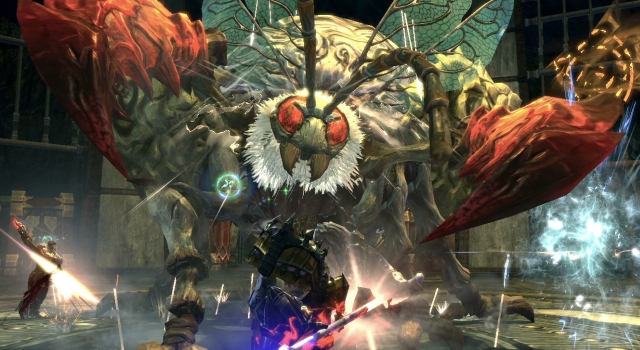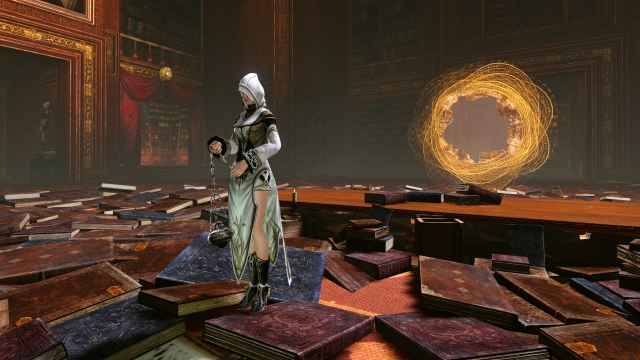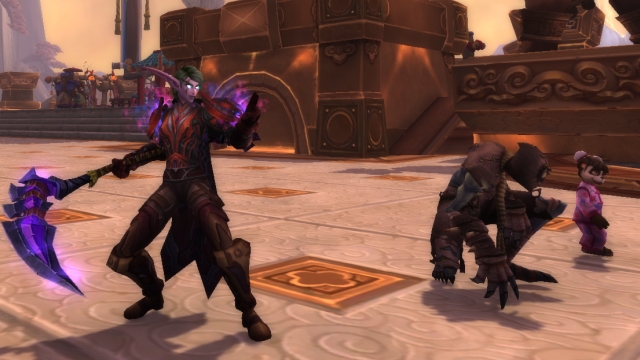Reputations are probably the most important part of your guild that you don’t get to control directly.
Most of the stuff I talk about in this column is something that you, as an officer or member, can do something about. If you’re an officer, you get to set the rules for your guild and make sure your members are following them. If you’re a member, you get to be responsible for your own behavior as well as providing feedback to your officers to make sure that the guild is working well. You have control over all of this. But you don’t have absolute control over your reputation; if someone says loudly enough that your guild is a bunch of jerks and enough people believe it, you will forever be known as a bunch of jerks.
It helps, of course, if your guild in this scenario is not literally named A Bunch of Jerks, but there’s something to be said for unified branding.
Let’s be real, though; while reputation is not under your direct control, it’s still something you have quite a bit of influence over. You can’t force people to think your guild is not a bunch of jerks, but you can influence their perceptions substantially by not acting like a bunch of jerks. So let’s talk about managing your reputation, from both a member and an officer’s point of view.

Listen to other people
Not every single person in your guild is likely to be your close friend. It’s nice if it happens, sure, but most of the people you’re around are people that you at least theoretically like and trust. These are your people, and thus you’re inclined to give them your support and attention. So when some random dipwad from another guild says that a fellow guildmate was being a jerk, your first instinct is to tell the person in question to perform acts that are anatomically unlikely.
This is basic human instinct. It’s also the wrong attitude to take because it’s possible that your fellow guildmate was being a jerk. And even if he wasn’t, his actions are entirely predicated on the fact that you would not think he was a jerk.
The problem with always having someone’s back is that sometimes, all of us are wrong. Sometimes I am. Sometimes you are. Sometimes your best friend is probably a jerk to someone. And if your guild works like most friend groups, sticking up for its members no matter what, that’s a step down the road to being seen as jerks. Not because you shouldn’t support your friends, but because you’re not actually taking the time to ask whether or not your fellow members are being jerks to other. It’s possible that you’re having a legitimate behavior issue shared with you, and your first instinct downplays and loses sight of that fact.
If someone contacts you and says “this person did X,” thank them and tell them you’ll talk with the member about it. Hear their side of the story and decide if any rules were violated. Even if nothing comes of it, it helps your reputation by painting your guild as one with an emphasis on being able to listen to what other people say.

Take part in outreach
Your guild’s first obligation is to itself. That is natural and smart. If your guild can easily clear Mythic raids in World of Warcraft, you are not obligated or even encouraged to carry people who struggle with normal difficulties. But boy, it sure does bolster the way the community sees you if you do anyway.
Reaching out to the larger community as a guild has two effects. One, it makes other guilds see you as something to aspire to, which is a good thing. Two, it makes people who aren’t affiliated with your guild want to be like you if not actively a part of the guild. Running events and overcoming challenges with a focus on the community as a whole rather than just your immediate guild winds up doing wonders for your reputation.
Of course, in order to run an event for everyone, you have to have something your guild can offer that not everyone has. Bringing in random outside strangers for progression is not a good idea. But when you’re farming something simple anyway, why not bring along some people who otherwise would not be able to go? Why not make it something several parts of the community can experience?
Basic logic makes it clear that your guild is first and foremost concerned with, well, itself. That’s what keeps guilds running, after all. But from that basis, you can either move on to the idea that other people owe you something for helping out the community as a whole, or you can assume that you owe something to the community when it costs you nothing. Generosity tends to be remembered more positively.
It’s also helpful on this point with a sufficiently large guild to have an officer specifically handling outreach with other guilds and cooperative ventures. Making it clear that your guild is willing to work with others and has an obvious point of contact helps solidify interactions and encourage cooperative ideas.

Encourage knowledge
Every single group of players has its dumbest member. No matter what tier you’re playing at, there is someone who is notably lower than everyone else, and unless your guild exclusively works with its own members (which, as mentioned before, is a bad idea), you will have to deal with that dumbest member encountering others. The question then becomes whether you want that dumbest member to be the one who slightly misspells the names of planets in Star Wars: The Old Republic or the one who doesn’t have any idea which specialties can serve as tanks.
Encouraging knowledge within the guild seems like the sort of thing that would only benefit your own guild, but it ripples outward. If I meet two people from the same guild spouting the same utter nonsense, I tend to think that that guild is not very well-run. By contrast, if I meet two people from the same guild who both prove to be brighter than average, I’m going to assume that the guild itself is better than average.
This is something of a hidden benefit of helping your guild get better all around. By improving your performance, you also improve the performance that your members will show when working separately. That means people will associate your guild in general with doing well, no matter how good you actually are. Sure, you might not be all that far in progress because progression is not your goal, but people know when a guild tag symbolizes that someone is on the ball, capable, and shares good information.
Obviously, none of these behaviors can prevent someone with a vendetta from saying that your guild is a bunch of jerks. But if you’ve established a good history, the odds are far more likely that another person in the conversation will say, “Hey, I’ve met those guys, they seem all right. Their guild name is A Bunch of Jerks, but they really aren’t.”
Still, you might want a different guild name, too. That can’t hurt.







Published: Aug 25, 2016 08:46 am